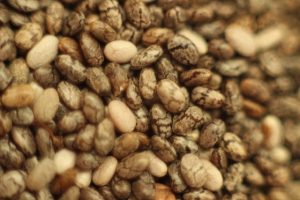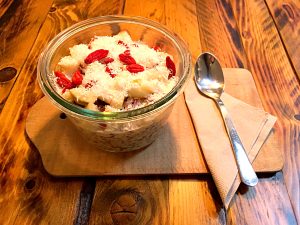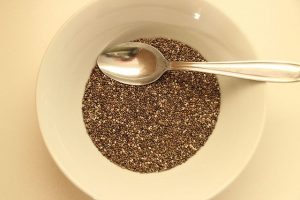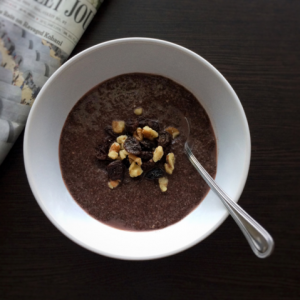 Chia seeds are above average rich in antioxidants, proteins, fibre, vitamins and minerals. They continue to have the highest omega-3 content of all (over 18 grams per 100 grams). But that’s not all: Chia seeds contain 10 times more omega-3 than salmon, 9 times more antioxidants than oranges, 4 times more iron than spinach, 5 times more calcium than whole milk, 15 times more magnesium than broccoli and 4 times more fibre than linseed. Furthermore, the chia seeds contain vitamins A and B, potassium, boron, zinc, folic acid and vital amino acids. According to a study by the Nutritional Science Research Institute (Massachusetts, USA), Chia seeds have a natural blood-thinning effect that significantly reduces the risk of stroke or heart attack. Furthermore, the study concludes that chia seeds have a positive influence on blood sugar levels and can regulate them.
Chia seeds are above average rich in antioxidants, proteins, fibre, vitamins and minerals. They continue to have the highest omega-3 content of all (over 18 grams per 100 grams). But that’s not all: Chia seeds contain 10 times more omega-3 than salmon, 9 times more antioxidants than oranges, 4 times more iron than spinach, 5 times more calcium than whole milk, 15 times more magnesium than broccoli and 4 times more fibre than linseed. Furthermore, the chia seeds contain vitamins A and B, potassium, boron, zinc, folic acid and vital amino acids. According to a study by the Nutritional Science Research Institute (Massachusetts, USA), Chia seeds have a natural blood-thinning effect that significantly reduces the risk of stroke or heart attack. Furthermore, the study concludes that chia seeds have a positive influence on blood sugar levels and can regulate them.
This information has not only been known since 2015: Central American long-distance runners, warriors or travellers in pre-Spanish times had all of them in their luggage: Chia seeds in a wide variety of preparation stages instead of the muesli or protein bars that are common today. In Central America (next to Quinoa) Chia was considered to be an easily transportable, almost indefinitely long-lasting food for strength and energy. Chia was also used as a medicinal plant. 500 years after the conquest of America, knowledge of the amazing properties of the Chia plant, Latin Salvia Hispanica L., from the family of lip-flowering plants, is now gradually being rediscovered.
Chia seeds - The side effects
Chia seeds - intake, dosage & application
Chia seeds - nutritional values, calories and ingredients
Chia oil - The vegetable Omega3 source
Delicious Chia seeds recipes
Experience around Chia seeds
Chia seeds and their health effects
Buy Chia seeds
The Chia plant
Slimming successfully with Chia seeds
Chia seeds & our health
Studies around Chia seeds
This is contained in chia seeds
Omega-3 fatty acids
At about 19 grams per 100 grams of Chia seeds, Chia is the most luxuriant vegetable donor, a portion of Chia seeds covers the daily requirement three times over. The substance is important for the regulation of blood pressure, blood lipid levels and blood clotting. Protein synthesis and almost all metabolic processes require omega-3 fatty acids, among other things. Better cerebral blood circulation and increased serotonin levels promote mental performance and even prevent depression, to cite just two examples. In order to achieve the optimum effect, omega-6 fatty acids must also be supplied in the correct ratio, i. e. 1:3, just as both fatty acids are present in the Chia seeds.
Dietary fibres
Approximately 8 grams of dietary fibre per 25 grams (daily ration recommended by us) Chiasamen make you satisfied for a long time and promote digestion by filling the intestine well and binding large amounts of water. Because many dietary fibres in the food also increase bile acid excretion, among other things, more bile acid has to be reproduced – cholesterol is necessary for this and the level of cholesterol in the blood decreases accordingly.
Another positive side-effect is that dietary fibres slow down the breakdown of carbohydrates. Therefore, less insulin enters the organism. People who perform well or suffer from diabetes benefit. This avoids cravings or hypoglycaemia. Studies have already documented the effect of dietary fibre in detail (see above).
Proteins
proteins or their building materials, the amino acids, control all body functions and supply vital energy. Chia seeds consist of more than 20% protein and are therefore at least equal to the soybean as a vegetable protein donor. They thus make an important contribution to the protein production of vegans. Protein supports effective diets in combination with muscle training, as a study by the German Nutrition Society (Deutsche Gesellschaft für Ernährung) has already shown in 2012. A targeted, higher protein intake curbs the appetite and helps to reduce cholesterol and liver fat levels.
Vitamin B1
Two tablespoons of chia seeds cover about 11% of the daily requirement. Among other things, the vitamin provides “fuel” for the nerve cells.
Vitamin B3:
Again, two tablespoons of chia seeds provide about 18% of the recommended daily intake. Vitamin B3 is involved in building up skin and muscles, helps detoxify the body, strengthens the nervous system and connective tissue and ensures beautiful, healthy skin.
Vitamin E:
Two tablespoons of chia seeds correspond to almost one third of the daily requirement of antioxidants from the family of E-vitamins, which have a positive and protective effect on skin and hair, nerve cells and the immune system.
Calcium:
The calcium content of a tablespoonful of Chia seed far exceeds that of a glass of milk and is biologically better utilizable. Calcium is essential for the skeletal structure, blood clotting, nerve stimulus transmission and energy metabolism.
Iron:
Approximately 1.65 mg iron per 25 grams of chia at 2 tablespoons covers 13% of the recommended daily ration. Chia is almost three times more ferrous than raw spinach. Iron binds oxygen and supports the oxygen supply in the organism.
Potassium:
150 mg potassium – important for muscle and nerve functions in the body – is contained in 25 grams of chia. This corresponds to 8% of the recommended daily amount.
Copper:
25% of the daily copper requirement covers 2 tablespoons of Chia seeds. The trace element is required for example for iron formation, the immune system and wound healing.
Magnesium:
The high magnesium content of 73 mg per 25 grams covers a hint of the daily ration. Magnesium controls nerve and muscle activity, sleep-wake rhythm and fat metabolism.
Phosphorus:
135 mg on 25 grams of chia seeds cover 11% of the recommended daily dose. Phosphorus is necessary for the stability of bones and teeth.
Zinc:
1.25 mg zinc per 25 grams covers 8% of the daily requirement and supports the body’s own immune system and many metabolic processes, for example.
Antioxidants:
Some of them, such as flavanols, are present not only in chia seeds but also in dark chocolate, grape juice or wine. They keep white blood cells agile and vascular walls flexible, thus preventing arteriosclerosis, for example. In addition, antioxidants prevent cancer cells from growing.
Other effects:
Chia seeds can bind a lot of water when soaked. With such a Chia ration, dehydration can be effectively prevented during sporting exertion.
Chia seeds and their use
Chia seeds are gluten-free and provide important nutritional components such as omega-3 fatty acids (highest vegetable content), antioxidants, protein (shown to help build muscle and connective tissue through their high protein content), vitamins, minerals and dietary fibres, which make them extremely rich for an extremely long time. A number of studies have already been carried out on the exact interaction and biological availability of the substances and active substances contained.
Why Chia seeds help you lose weight
 People who consume more calories than they “burn” will gain weight. Halving the daily ration, the body switches to energy-saving mode and at the end of a diet, the jojo effect occurs, and those affected gain more quickly. In contrast, only a fundamental change in the diet can help with Chia seeds:
People who consume more calories than they “burn” will gain weight. Halving the daily ration, the body switches to energy-saving mode and at the end of a diet, the jojo effect occurs, and those affected gain more quickly. In contrast, only a fundamental change in the diet can help with Chia seeds:
Chia seeds absorb a lot of liquid, both during preparation and in the intestine. This is one reason to drink a lot when Chia seeds are consumed. They fill the stomach and create a lasting feeling of satiety. The abundant dose of dietary fibre serves the same purpose. The carbohydrates of chia seeds are released only very slowly in the body – the blood sugar level remains constant, hunger attacks or “hypoglycaemia”, which impairs the performance as well as the mood, are absent. Chia seeds mixed into muesli or yoghurt for breakfast, keep you full for a long time. The excellent nutrient profile of Chia does not cause any deficiency symptoms even with reduced food intake. Calorie-rich “snacks” become unnecessary. Combined with a lot of exercise and targeted muscle building, Chia is an ideal support for losing weight. Please also read our article Slimming with Chia seeds.
Chia seeds lower cholesterol levels
Too much cholesterol in the blood is considered a risk factor for health: The arteries tend to calcify more strongly, and the narrowed blood vessels can lead to strokes or heart attacks. People who smoke, do not move enough, suffer from overweight or increased blood pressure are concerned about high cholesterol levels.
If all these factors come together, a radical change in diet is recommended. Chia seeds as an integral part of breakfast do not only satisfying for a long time, they are also the best vegetarian supplier of omega-3 fatty acids, above all alpha-linolenic acid. This regulates the cholesterol metabolism sustainably. In addition, the dietary fibres in the chia seeds serve the same purpose, as some studies have shown.
Chia seeds are effective against heartburn
Heartburn occurs when gastric acid gets out of the stomach. Typical is a burning pain rising from the stomach area behind the sternum, often coupled with acidic puffing. The sphincter, which connects the esophagus and stomach, may allow leftover food and aggressive gastric acid to flow back into the esophagus, causing unpleasant symptoms. Stress, an irritated stomach, eating too much or too much fat, and in pregnant women the pressure of the foetus on the stomach can cause heartburn. If it occurs regularly and violently, medical treatment is advisable. As a first aid, however, chia seeds are a good and side-effect-free remedy: a teaspoon of dry chia seeds with a subsequent cup of water reliably binds excess gastric acid: the seeds absorb any liquid, in this case the acid, and heartburn remains.
Chia seeds & the regeneration of cells
After operations or injuries, but also after strenuous physical training, it is important that cells regenerate quickly, that new tissue is formed or that muscles “gain”. Whoever enriches his breakfast muesli or yoghurt with chia seeds, for example, will not only remain full and efficient for a long time, but will also promote cell growth. Not only the trace elements and vitamins in the chia seeds are responsible for this, but also the high proportion of omega-3 fatty acids and amino acids. Both are important building blocks for a healthy metabolism.
Chia seeds for a healthy heart
Since the regular intake of chia seeds provides the body with a high amount of omega-3 fatty acids, the ratio of “good” and “bad” cholesterol is soon balanced, the risk of deposits in the blood vessels and associated cardiovascular diseases decreases. In particular, alpha-linolenic acid (LAA) improves the flowability of the blood and blood circulation. High blood pressure may be reduced: many good reasons to use chia seeds as food.
Gradually, nutrition experts and physicians find out that chia seeds are much more versatile in their application than previously assumed. Among other things, their consumption can lower cholesterol levels, regulate blood pressure and blood sugar levels, have a positive effect on the immune and nervous systems and can even influence brain activity.
In the Maya and Aztec communities, chia seeds were known for their ability to bind toxins and acids and promote their elimination. Other areas of application include the treatment of wounds, joint pain, irritable bowel syndrome or heartburn or the regulation of blood sugar levels, for example in diabetes.
Chia seeds for gluten intolerance
Many people suffer from a gluten intolerance or coeliac disease and can hardly or not at all digest products made from wheat flour: skin, digestive tract and respiratory tract react differently with allergy symptoms and sufferers are often generally dull and beaten off. Chia seeds are gluten-free.
Chia seeds against arthrosis and joint pain
Arthrosis – associated with chronic joint pain and even movement restrictions – affects many people, including younger people. The cause of osteoarthritis is wear and tear of the cartilage layer in the joints. Malpositions and incorrect loading, lack of exercise with obesity, bleeding or injuries that make the joint unstable, but also genetic defects or metabolic diseases can be the triggers. The joint gap shrinks, the cartilage layer becomes thinner: constant pain in movement, pain in starting and morning stiffness are clear signs.
If the organism attempts to break down the “abrasion residues” in the joint, tissue and cell remains of damaged cartilage and bone substance, enzymes are formed which further attack the remaining cartilage layer and strengthen the inflammatory process. This stage is also characterized by severe rest pain.
In order to preserve the remaining cartilage layer, it is particularly important to stop inflammations in the joint in time. Chia seeds are a useful addition to the menu in arthritic diseases. They contain a high proportion of omega-3 fatty acids, especially alpha-linolenic acid (ALA). This improves blood circulation, which supports the supply of nutrients to the joint cartilage. At the same time, ALA has a strong anti-inflammatory effect. In addition, chia seeds are rich in antioxidants and vital substances, which promote cell renewal, regenerative and healing ability after heavy stress or injuries.
Chia seeds promote wound healing
Chia seeds outperform many well-known foods with their vital nutrient profile. They supply amino acids, trace elements and a wide range of vital vitamins. In this way, they support cell renewal and the body’s ability to regenerate and heal.
Chia seeds in diabetes
 Type 2 diabetes is now a widespread disease. Since the organism either does not produce enough insulin from the hormone or is unable to utilize it sufficiently, it is also not able to regulate the blood sugar level. If left untreated, the “diabetes” has serious consequences.
Type 2 diabetes is now a widespread disease. Since the organism either does not produce enough insulin from the hormone or is unable to utilize it sufficiently, it is also not able to regulate the blood sugar level. If left untreated, the “diabetes” has serious consequences.
However, a radical change in lifestyle and diet can improve the situation. Chia seeds belong to the foods with a very low glycemic index – this means that complex carbohydrates are only absorbed by the body extremely slowly due to a high proportion of soluble dietary fibres, with hardly any glucose being formed and the blood sugar level remaining constant. Chia seeds are therefore the perfect complement to a diabetic diet.
Chia Seeds & Irritable Bowel Syndrome
If flatulence, abdominal pain and irregular digestion are part of everyday life for a long time without the doctor being able to find a specific cause, this is known as irritable bowel syndrome. Often the physical symptoms are accompanied by depression and anxiety. Chia seeds have a beneficial and balancing effect on the intestinal function: their high content of soluble fibre absorbs a lot of liquid and causes a strong swelling in the intestine. Their volume often multiplies by a factor of twelve, which in turn increases the stool volume and promotes the cleansing of the entire intestine. If there is a tendency to constipation, the insoluble dietary fibres stimulate intestinal activity. The detoxifying effect of the chia seeds then facilitates the absorption and utilization of important vital substances via the intestine.
The abundant omega-3 fatty acids can alleviate a depressed mood or stress symptoms, which in turn has a calming effect on a stress-stressed digestive system.
Celiac disease is an autoimmune disease in which the immune system attacks the intestinal mucosa when digesting food containing gluten. Gluten is also suspected of contributing to chronic thyroid inflammation, the Hashimoto syndrome. The safest method for those affected to remain free of symptoms is to avoid food containing gluten. Unfortunately, the “adhesive protein” is hidden in many foods. However, you can consistently use gluten-free ingredients in your own household: with ground chia seeds mixed in warm water, for example, you can make nutritious and tasty bread and pastries together with gluten-free cereals, mix muesli or “bind” sauces, soups and vegetables.
Chia seeds & thyroid diseases
The thyroid gland produces vital hormones for the metabolism. Serious illnesses often occur in cases of over- or underfunction. Chronic inflammation paired with hypofunction often indicates Hashimoto’s thyroiditis – what causes this syndrome can only be suspected so far. Symptoms of hypofunction are typically weight gain, loss of performance and concentration, depression.
In the event of an overfunction, the thyroid gland visibly and noticeably enlarges and produces more hormones than the body needs. Possible symptoms include a constant feeling of hunger, nervousness and insomnia, tachycardia, increased blood pressure, hair loss or osteoporosis. Those who suffer from thyroid diseases should supplement their diet with chia seeds. They replace some gluten-containing foods in the kitchen, to which many people develop autoimmune reactions. They also provide plenty of selenium and zinc, trace elements that regulate the function of the thyroid gland, and antioxidants. In addition, they support intestinal cleansing and detoxification – all steps that improve the body’s nutrient uptake, stop inflammatory processes and rebalance the hormone balance.
Chia seeds help to drain the body
Those who tend to accumulate water in the tissue can support the organism with the right nutrition regardless of the physical cause. For example, rice, potatoes or asparagus, strawberries and a large number of herbs that are suitable for seasoning or tea, such as lemon balm or lovage, have a draining effect. Digestive and laxative foods are also helpful. It is important to always drink enough and, if possible, to exercise extensively during a dewatering cure. If you drain too much water, the potassium level can rise too high.
Chia seeds absorb a great deal of liquid themselves, and they also effectively support all measures for weight loss and drainage by cleansing and detoxifying the intestines.
Magic delicious recipes with Chia seeds
 Because chia seeds are odourless and tasteless, they can be mixed in practically anywhere, for example in power drinks, smoothies or muesli. The recipes are completely uncomplicated and quick to prepare. The recommended amount in Germany is about 15 grams per day, in the USA you are more generous and advise a maximum of 50 grams of unprocessed seeds per day.
Because chia seeds are odourless and tasteless, they can be mixed in practically anywhere, for example in power drinks, smoothies or muesli. The recipes are completely uncomplicated and quick to prepare. The recommended amount in Germany is about 15 grams per day, in the USA you are more generous and advise a maximum of 50 grams of unprocessed seeds per day.
The classic: about 1/3 cup of Chia seeds are stirred into two cups of water and used immediately, or the mixture can be left to swell for as long as you like (minutes, hours or overnight). The resulting gel-like consistency of the mass is very long-lasting in the refrigerator due to the antioxidants it contains and can be easily mixed in soups, salads, muesli, bread, pudding or smoothie. If you want to keep the effort low, but want to lose weight effectively, you can use Chia Gel and mix it several times a day with fruit juice or as the basis for a chia pudding, for example with almond milk and fruit topping. Just try it out!
Sprouts for salad:
Chia seeds are very germ-free. Fresh, vitamin-rich sprouts for salads can be grown in a pot, on ceramics or in special trays.
Gluten-free:
For gluten intolerance, the use of chia seeds can easily replace other cereals by spreading them on yoghurt or using them as a flour substitute when ground 1:1. Corresponding baking recipes have already been successfully tested.
Egg substitute:
A fully-fledged egg substitute can be made from one tablespoon of ground chia seed and three parts of water per egg, stirred into a dough and baked. Healthy seeds can also be used whole or ground, but it is important to drink plenty of water after eating, because the seeds absorb a lot of water.
For those keen on experimenting, numerous recipes have long been known, for example for smoothies, homemade energy bars or puddings. Especially those who do sports can start the day with a Chia breakfast, because they are extremely satisfying.
For figure- and health-conscious people
The advantages of the Chia seeds for nutrition and figure-conscious people are obvious. Chia seeds supply:
– few calories
– many fibers
– abundant protein
– above-average amount of omega-3 fatty acids
– plenty of antioxidants and minerals
– are scientifically considered good & healthy for the body
and thus help indirectly but effectively in slimming and simultaneously in muscle building. For example, anyone who supplements a low-carb diet with Chia Power Drinks, which can be mixed quickly and easily, will not suffer from sudden hunger attacks on sweets and will remain full and fit even during heavy mental and physical exertion. The seed tastes good (as opposed to e. g. the seed. Linseed) neutral, due to the lack of flavor it can complement any recipe.
Through the ability to bind fluids, Chia seeds help detoxify the body, cleanse the intestines and even prevent heartburn.
If you want to eat only vegetarian or vegan food for dietary reasons or because you are convinced, you will find an important source of calcium and proteins in chia seeds. In combination with the other active ingredients, Chia is a perfect supplement for a balanced diet, even without meat and other animal products. Moreover, if you are uncomfortable with gluten-containing foods, you can vary your diet accordingly with Chia.
The high proportion of omega-3 fatty acids in the Chia seeds ensures mental fitness and good mood. Blood lipid values, blood pressure and in combination with the high proportion of dietary fibres, also the cholesterol level can be positively influenced by regular consumption of Chia seeds. If you want to keep a lot of love for your good health and want to live healthy, we answer you with Chia seed. When are you going to try the Maya seeds?


